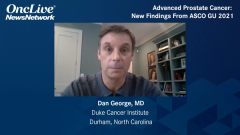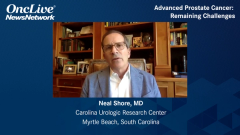
Advanced Prostate Cancer: Remaining Challenges
Experts discuss challenges and unmet needs in men with advanced prostate cancer who are undergoing treatment with androgen deprivation therapy.
Neal Shore, MD: What are the remaining challenges for all of us who treat advanced prostate cancer patients and who undergo testosterone [T] suppression? We have learned a lot over the years to become better stewards of the multitude of adverse reactions that occur with T suppression for these men, including loss of sexual function; thermoregulatory discoordination; in terms of hot flashes, which can be very debilitating; bone demineralization; and the quasi-metabolic syndrome, which can also lead to cardiovascular events.
Cardio-oncology, which has gained great importance throughout cancer oncolytics, has something that urologists, medical oncologists, and radiation oncologists need to be aware of: the opportunity to start a patient, who may be at increased risk for cardiovascular events, with a potentially safer drug, a more convenient drug, and 1 that has demonstrated its T-suppressive benefit. That is the goal of all androgen deprivation therapy [ADT] when it’s appropriate. This augments our treatment toolbox.
There are some additional data points that we need to get a better handle on; drug-drug interactions with other molecules that always have a possibility. We see this in various other oral oncolytics that we’re using throughout GU [genitourinary] oncology, and certainly in prostate cancer. Those studies are ongoing. We had a nice presentation at ASCO GU [American Society of Clinical Oncology Genitourinary Cancers Symposium] this year looking at the safety and efficacy of combining relugolix with radiation therapy patients, as well as docetaxel and enzalutamide.
Testosterone suppression is remarkably effective and powerful for many of our patients with advanced prostate cancer throughout their treatment journey; however, maybe 1 day we’ll be able to treat patients with other alternative modes of therapy that don’t require testosterone suppression. But for now, the approval of relugolix for our patients with advanced prostate cancer who require androgen deprivation at the appropriate time is a most welcome option, especially with the enhanced cardiovascular safety profile.
Dan George, MD: Going forward, we are going to continue to have challenges in managing our patients with advanced prostate cancer with ADT; some of which relugolix can help. There is a concern of the cumulative effects of antigen deprivation therapy in patients with cardiovascular risk. We’re beginning to recognize more on how prevalent this is, particularly in our real-world populations.
One of the things that stands out from the HERO study is how frequent lifestyle cardiovascular risks, including smoking and obesity, were in our patient population; and how frequent comorbidities were, including preexisting hypertension, diabetes, and prior history of stroke or heart attack. When we get into our real-world patients, we expect these rates to be even higher. Recognizing what the effects antigen deprivation therapy has on cardiovascular risk is going to be increasingly important. Identifying therapies that carry a low burden of cumulative risk of cardiovascular events is going to be vitally important to the long-term survival of our patients, especially as they live longer, as we treat older men, and as we combine our antigen deprivation therapies with other treatments that also increase the risk of major cardiovascular events, like stroke, heart attack, and sudden death.
These include, as a class, the novel antigen receptor antagonists, our chemotherapies, and even some of our systemic radiotherapies—all could increase some of these risks. We are going to see more of this risk evolve. Having a baseline therapy that is associated with the lowest cumulative risk of these events is an unmet need and something that the HERO data, relugolix in particular, address.
Stephen Freedland, MD: When thinking about the remaining challenges and unmet needs in this patient population, 1 is whether the antagonists are really better. We have this strong signal, and hopefully we will have that answer someday. It looks promising that the antagonists are going to be more heart-healthy.
Even with that, even if they’re more heart-healthy, being castrated has its effects. It increases the risk of diabetes, which in turn is a major risk factor for cardiovascular events. How can we do even better? What is the right lifestyle approach to get these men to combat the cancer and reduce the adverse effects of cardiovascular and diabetes risk, weight gain, and fatigue? These are the effects that men get that make hormonal therapy unpleasant for some. How can we bring in lifestyle and pick the right ADT, and maybe other agents, to minimize those risks but get improved cancer control?
The data that we have in this disease space is from white men. We don’t understand the impact of our treatments well on minorities, particularly the African American population, which is at an increased risk of having aggressive prostate cancer. We know little about Hispanics. It appears that they have similar outcomes, in terms of cancer, to non-Hispanic whites, but country of origin makes a difference. Puerto Rico has higher risks than some of other places. Understanding how hormonal therapy works, how agonists and antagonists work in these populations, and how our lifestyle interventions work in these other populations remains a great unmet need in this field.
Transcript Edited for Clarity
*Dr Freedland receives consulting honorarium from Astellas, Pfizer, Janssen, Clovis, Merck, AstraZeneca, Sanofi, Bayer, and Myovant. He is a speaker for AstraZeneca and Sanofi.







































